1974
- Songs written around this time include "Ain't No Books Sold," "Dance Dance Dance," "Don't Pollute the Truth," "Going Home," "Harmony," "I Close My Eyes... A Winter Song," "I Dig Music," "I Don't Know," "I Just Want to Praise the Lord," "I'm Not Very Good At Love Songs," "I'm Sorry," "Into the Sky," "K J Raffe," "Lake Between The Hills," "Lonely World," "Monkeys," "O Sinner Man," "Peace of My God," "Psalm Suite," "There's A Land," "Profit," "Winter Hymn," and "You've Been So Good To Me."
Mid 1974
- Songs written at this time include "'Tis Spring," inspired by memories of visiting his Grandma and Grandpa Lewis and Uncle Dick.
August 1974

(Cincinnati Bible College)
- Richard begins attending Cincinnati Bible College. He lived in a single dorm room during the first semester. The second semester he roomed with Mike Schultz.
- During his years at CBC, Rich was rejected four times attempting to enter the College's Talent Show. Dr. King (of the music department) said that it was because he pounded too hard on the piano. He had said that he could sit down at any piano in the department and tell of Richard had played it. Richard later got his revenge by poking fun of Dr. King in a song entitled "Dr. Sting."
Rich: "I was allowed to play a piano duet once. And I accompanied several people. I just could never cut the mustard. I was very hurt and angry. I was going, 'You know, I could take this if the people who were in this were really excellent.' But they weren't. I don't like the idea of a talent night anyway. I was too competitive to deal with it very well."
August 12 and 13, 1974
- Reed Arvin and Light Trio perform a show of "Progressive, Classical Jazz" at Eric the Red Lounge in Wichita, KS. The trio consisted of Reed Arvin (18), Bassist Bob Dean (21) and Dave Adams on Drums. Local newspapers state that the trio is currently negotiating a contract with ABC Records in hopes of recording a musical, written by Arvin, about a young college girl's questions and hangups before finding Christianity. Newspapers also mention that Reed has been commissioned to write an original number for next years Wichita Jazz Festival - the first time the festival's board of directors has commissioned an artist to do this.
Reed: "Last week, we had people listening to us who were in college, high school and people 40 years old."
Reed: "Being commissioned to write a jazz piece for the festival is a big thing for me. It's the best thing that's ever happened to me."
August 16, 1974
- The Children of Light open for The Imperials perform at the Municipal Stadium Ballpark in Richmond, IN. It has been said that Rich forgot about the show and missed it. (Note: At this time, I cannot confirm the story or the date of the show that was missed. It is possible that the Children of Light opened for the Imperials at an earlier date since Rich would have been attending college at this time. It is also quite possible that Rich missed the show *because* he was in college at the time).
September 1974
- Richard meets Gary Rowe.
Gary Rowe: "I met Rich when we were Freshmen together at the Seminary in 1974. His room was across the hall from mine. Then I got to know him much better because the guy who was my roommate was a bass player and when Rich wanted to start doing some concerts on campus, he got together with Mark (Hard)."
- Richard would sometimes get together with Dave Workman (Drums) - later of the band Prodigal, and Paul Niehaus (Bass) to jam in the evenings.
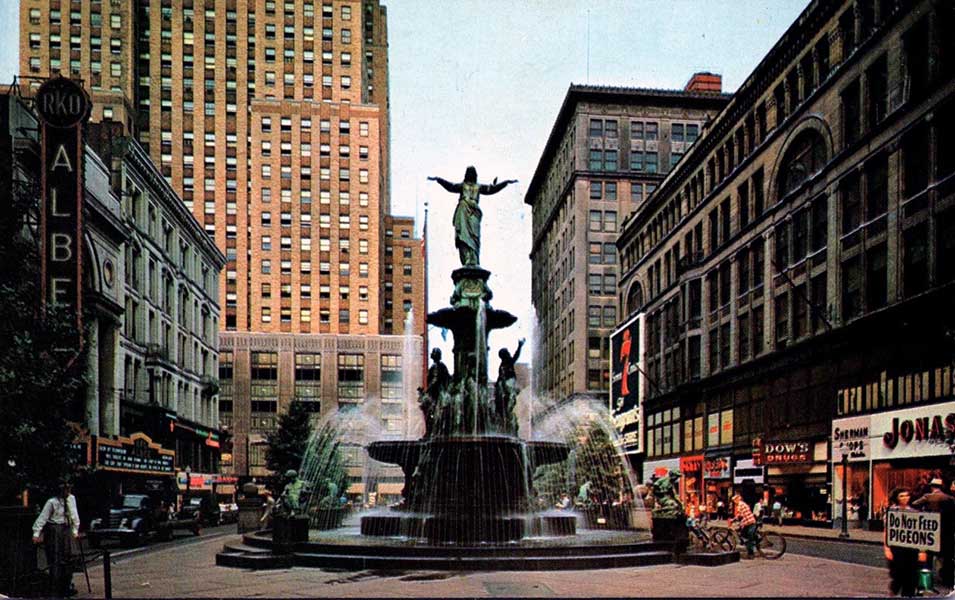
Fountain Square, Cincinnati, OH 1970s
Early September 1974
- Richard writes the song "My Heart Stopped Beating." "Rolling Stone" is also written somewhere around this time.
October 5, 1974
- Children of Light perform at Faith Baptist Church in Webster, IN. (Richard likely did not perform with the choir at this show.)
October 13, 1974
- Children of Light perform at The Friends Church Rally Day. (Richard likely did not perform with the choir at this show.)
November 23, 1974
- Rich Mullins performs at the Jesus House in Cincinnati, OH for the first time.
December 1974
- Richard Mullins performed his first concert at Cincinnati Bible College in the music room below the women's dormitories. At his concert, he played the song "Seminary Girl" for the first time.
Set List: I Dig Music/Harmony/O, Sweet Jesus (from American Suite)/Don't Pollute the Truth (from American Suite)/Seminary Girl/Going Home/The Restoration Plea
1975
Dave Mullins: "All during his time in Cincinnati, he was so poor. I can think of a couple of places that he lived - in some apartments that, as I remember, mom and dad wouldn't even really go in. I remember him talking about one of his apartments where he slept in a rubber raft out on the fire escape because someone had shot through the floor one night. He lived in the 'hood' in Cincinnati." (Source: David Mullins, A Ragamuffins Legacy documentary, 2014)
- For four years, Rich worked as a cashier in Shillito's Department Store parking garage in Cincinnati, OH to pay for school. He would sometimes get together with Dave Workman (Drums) - later of the band Prodigal, and Paul Niehaus (Bass) to jam in the evenings.
Beth Snell Lutz: "He was working part time at a parking garage downtown cashing out folks as they left. Most paid in cash back then, and he played games with their change, writing rhymes of numbers and lyrics of rhymes. It was also where he perfected what became a legendary "art" of driving, seemingly mindlessly, racing the levels of the garage in high speed circles, screaming to a stop within an inch of the next car. Riding with him through the years taught me never to look to where we were going, but instead at the driver or the yarn I was crocheting. To this day, I can ride unafraid with the worst drivers. "
- Throughout the year, Richard Mullins performed concerts at venues in Waynesville, Canton, Ohio and other places.
- Richard took his friend Beth Snell to Seton High School to see the movie Brother Sun, Sister Moon.
Beth Snell Lutz: "Richard loved going to movies. When I first met him in 1975, he talked me into sneaking into the back of the auditorium at Seton High School, a Catholic girls' school in Cincinnati, to see Brother Sun Sister Moon, so I'd understand why he talked so often about St. Francis. If you knew him well, you know that if he saw a movie he liked, before long he would drag you, and anyone standing nearby, to see it... sometimes even paying for everyone to get in... even before he had money. There, were movies he saw dozens and dozens of times, i.e. Harold and Maude, The Holy Grail, Amadeus, Star Wars, Dances with Wolves among them, because of these group outings. As an Indiana boy, one of his early favorites was the movie Breaking Away because it was filmed in Bloomington, Indiana, a Hoosier college town he loved to frequent."
- Songs written around this time included "Bitter Boy," "Country Mornin'," "Devil's Back," "Elegy for the Roses," "Happy Day Express Medley," "It Must Not Be the Wind," "Movie Star," "The Rainbow Song" (Rich said he never titled the song, but this was the name given to the song by people that went to see him perform), and "Restoration Plea."
- At some point while attending CBC, Rich meets a girl named Susan who, thanks to something she said, would become partial inspiration for the song "What Susan Said." Many years later, Rich would introduce Mitch McVicker to the real life Susan during a concert in Cincinnati in 1996.
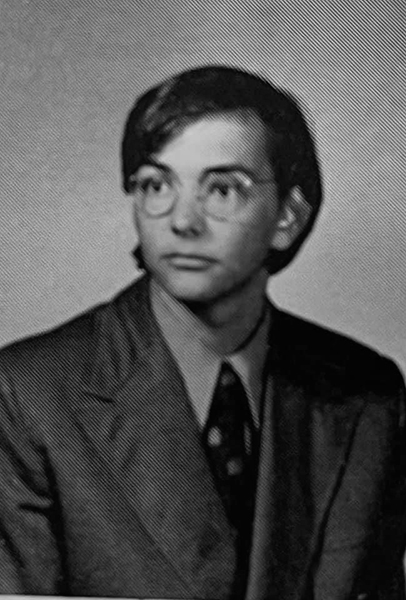
(Photo of Rich from Cincinnati Bible College 1975)
- It was somewhere around this time that Rich began to formulate an instrumental on the piano that would be used for years to come as an intro to songs during performances. This instrumental piece, dubbed "Rich's Piano Signature" by friends, would eventually find its way into the backing music of The Canticle of the Plains.
January 11, 1975
- Rich Mullins performs at the Jesus House in Cincinnati, OH.
March 29, 1975
- Richard's sister Sharon is married to Ronald Roberts at Whitewater Christian Church in Whitewater, IN. Richard was a soloist and played organ and piano during the ceremony.
April 1, 1975
- Rich Mullins and friend Rich Griffith attend the Seals & Crofts concert at Cincinnati Gardens in Cincinnati, Ohio. After the concert, they stayed behind while Jim Seals and Darrell "Dash" Crofts came back on stage and talked about their Baháʼí faith. (Source: Rich Griffith)
April 20, 1975
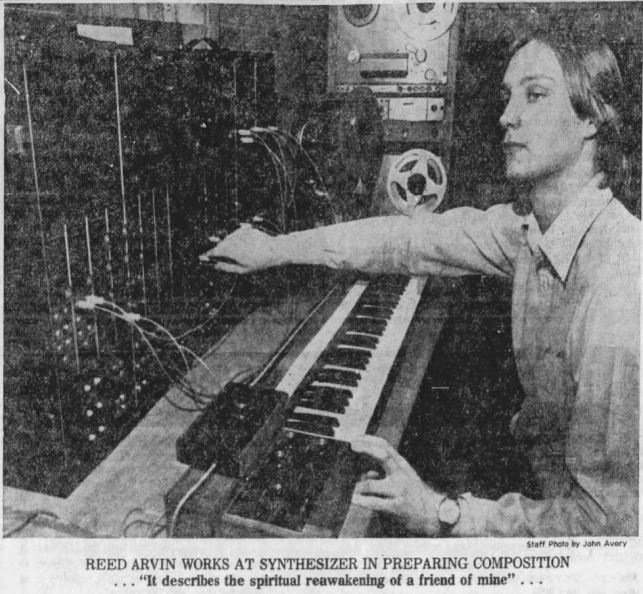
- Reed Arvin and five other musicians perform a 20-minute original piece entitled "Jana" during the Wichita Jazz Festival at Century II Convention Hall in Wichita, KS. Arvin performs on electric piano, clavinet, synthesizer, and acoustic piano. Greg Richter plays electric piano and mellotron. Bill Glenn plays percussion. Mark Minkler plays bass. David Adams plays percussion and Brian Savagte plays saxaphone and flute.
Reed: "It's not traditional jazz. It describes the spiritual reawakening of a friend of mine. The first section describes her as an individual, then there are sections about the different forces that brought to bear on her life. First Satan's, then God's. Then comes the conflict and the final resolution of the conflict. Some of it is so soft you almost can't hear it; some of it is so loud it is almost painful. It is a linear work, it just sort of flows along."
Reed, on Jazz Music: "All the jazz musicians I know have to supplement their income by playing clubs. That's a scene that really brings me down, spiritually and every other way. As a whole, secular music is on a much higher level of quality than religious music, and it should be the other way around. Music intended to praise God should be a witness, it should speak to other people through its quality."
Reed, on being a Musician: "But I don't want to be a musician if I can't use my music in a Christian way. God is the driving force in my life right now. I come from a Christian home, so I'm blessed in that way. And two summers ago, I got to know the Navigators. They're a Christian organization -- really neat. If you want to go into music, you have to be dedicated. I almost east it and sleep it. Right now, my life is pretty much music and God, and - God comes first, of course."
Reed, on Jana: "She was into the social thing, you know. She was a Christian but not really committed. We met in Bible Study and she really turned her life around."
Reed, on Secretary of the Wichita Jazz Festival Maxcene Adams: "She sat me down and made me listen to records day after day. I said I had to give Maxcene all the credit. I'd have to give my parents a little credit too. They're great."
May 24, 1975
- Rich Mullins performs at the Jesus House in Cincinnati, OH.
July 13, 1975
- New Creations perform a one hour "Praise to God" musical at the Nashville Church of the Nazarene in Columbus, IN.
August 1975
- Reed Arvin and Light appear at Herman Hill Park in Wichita, KS. The performance is filmed and would appear on local TV as "Jazz in the Park" in January of 1976.
August 2, 1975
- Richard plays the organ during a wedding at South Salem Church of Christ in Union City, IN.
August 17, 1975
- Richard plays the piano during a wedding for Darla Miller and Michael Ash at a small country Church. Darla was a coworker of Richard's at Shillito's parking garage.
August 19, 1975
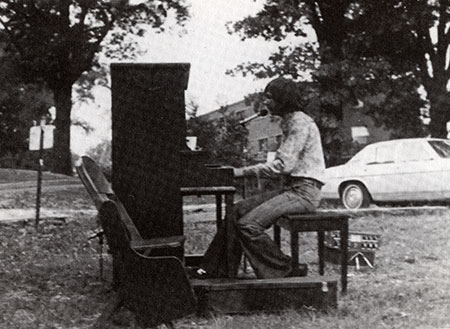
Rich's outdoor performance at CBC. (Photo courtesy of Beth Snell Lutz. August 1975)
- The First Night of Freshman Orientation at CBC, Rich meets his longtime friends Kathy Sprinkle, Jenny Filson, Sam Howard and Beth Snell. Sam Howard is the son of Rich's future mentor in Wichita, Maurice Howard. Richard would begin performing with Beth and Jenny as a trio.
Kathy Sprinkle: "Elizabeth and I came the year after and the very first night of Freshman orientation... they pulled this old beat up piano out. And this guy comes out and it looks like he hasn't taken a shower in a couple of days and he sits down and plays this amazing music and I'm completely blown away by it... I met him three weeks later. I couldn't stand him. "
Sam Howard: "I kind of wrote stuff and played guitar.... I said you should come by and talk about it and I remember sitting in the dorm room and I would play one of mine and he would play one of his, and another one of his. And I was, 'No, you just keep going. That's a lot better than what I got.' After he heard some of my songs, he asked me to be a part of the teaching team. (Laughter)"
Fall 1975
- Reed Arvin enrolls at North Texas State University.
Reed: "At North Texas State, I was blown to bits. I went there considering myself a very good player. Well... there are nine lab bands there. I tried out for each, and couldn't even make the last one, man. It gave me a new perspective in a hurry."
October 18, 1975
- Richard Mullins performs at the Jesus House in Cincinnati, OH.
Mid 1970s
- During his time at CBC, Rich hears a quote from a professor that would leave a lasting mark and be repeated in concerts for years to come.
Rich: "I had a prof one time - my favorite prof in the whole world - This is one of my favorite bible college stories. He said, 'Class, you will forget almost everything I will teach you in here, so please remember this: that God spoke to Balaam through his ass, and He has been speaking through asses ever since. So, if God should choose to speak through you, you need not think too highly of yourself.'"
- Richard attended many concerts throughout the 1970s including shows by Peter Gabriel (a couple of times), Genesis (several times), Yes (several times), Fleetwood Mac, Bruce Cockburn. He loved CSNY, Copeland's Appalachian Spring, Glass Harp, Bruce Hornsby, Cat Stevens, a local band called Willoughby Wilson Band, lots of Broadway plays, (Sweeney Todd, Equus, Out of the Woods, etc.)
1975-1978
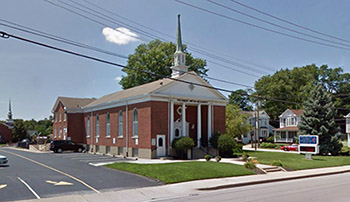
- Rich decides to focus on being a youth minister. Right around that time, a position opens up at the nearby United Methodist church in Erlanger, KY. Rich would spend the next 3 1/2 years working at the church as a youth and music minister. (sources: Rich and the United Methodist Church in Erlanger)
1976
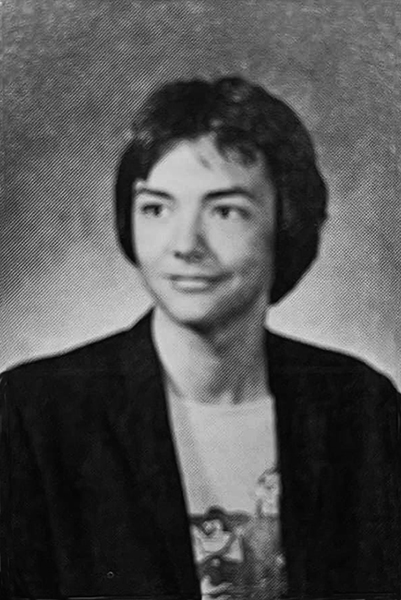
(Photo of Rich from Cincinnati Bible College Fall 1976)
- It was this year that Rich would write "Heaven In His Eyes," which would show up on Zion's album Behold the Man, and many years later on The Jesus Record. Rich would also write "O Come All Ye Faithful" around this time. That song would later be recorded by Debbie Boone in 1984.
- Other songs written this year include "All Around Me" (aka "Chimney Smoke"), "Alone," "And the Lord," "Come Lord," "Courting Song" (which was written to honor his father's heritage in the eastern mountains of Kentucky), "Crazy Boys and Lonely Nights," "Dr. Sting," "Elizabeth Anne," "Harlan County Waltz" (an instrumental featuring the lap dulcimer - later performed by Rich on his final tour in 1997), "Homeward Ways," "On and On (Like Music)," "One Moment More," "Once I Loved A Lady," "Pictures for a Friend in Summer," "Seminary Girl / Seminary Guy," "Tom Foolery," and "Turn for the Best."
January 4, 1976
- A local Wichita area TV Channel broadcasts "Jazz in the Park" featuring a performance by Reed Arvin and Light.
January 10, 1976
- Richard Mullins performs at the Jesus House in Cincinnati, OH. (Note the following set list was for a 1976 performance at the Jesus House, but it is unclear exactly which performance from the year goes with this set list. It is included here until a specific date can be determined.)
Set List: Monkeys/Dr. Sting/Seminary Girl/Profit/Dance/What Can I Give You/K.J. Raffe/My Heart Stopped Beating
February 21 & 22, 1976
- Richard Mullins is a guest speaker and performer at The Youth Happening at the Glencoe Church of Christ in Glencoe, KY. The services began at 7:30 each night and 53 teenagers attended.
June 1976
- Richard Mullins spends part of the summer hitchhiking across the country with friends.
Richard: "We left North Adams, Massachusetts and four weeks later, we were climbing Mount Washington in Northern New Hampshire There were three of us. We were walking together."
- Richard Mullins writes "Here In America" around this time.
Rich: "Well, I wrote that, probably around 1976 or so. I was hitchhiking, and normally I don't write a song in one sitting. Normally it kind of accumulates over a period of time. Like, I'll write a line or two, or I'll write a song and throw the song away, except I will find two or three lines that I really like and I'll save those lines.
It was just, I think it was after having been eaten by red ants and sleeping in a culvert that I really realized what a cool country this really was. Just kind of went, everywhere you go, it's different. And everywhere you go, it's hard. I mean, you come to the Midwest... you read those old John Steinbeck novels about, you know, the Dustbowl. And we have a history of 200 years of desperation, of people hanging on for dear life. Hanging on, because they believe there's gotta be something better than this. And I don't think people would have left Europe and the other places they left to come to America, if there weren't some pretty bad situations over there." (Source: The 1993 Music and More/Compassion International Interview conducted by Jon Rivers.)
July 4, 1976
- The song "King of the 4th of July" is written around this time. Rich's younger brothers, Lloyd and David came to visit him in Cincinnati for the Bicentennial festivities and to see the fireworks.
Beth Snell Lutz: "1976... the year of America's Bicentennial... and the release of Trick of the Tail, sadly the first Genesis album and tour without Peter Gabriel. That July 4 night, as we stood on the Suspension Bridge over the Ohio watching Rozzi's fireworks, Richard told his young brothers, David and Lloyd, that he'd like to be the King of the Fourth of July... and this song became. The next night, as he played, it was so like the song "Ripples" from the Genesis album of the same name, that he laughed and finished it with a riddle... aka Genesis. Though seldom played in concert, when July rolls around each year, I remember... and play it again."
July 1976
- Richard Mullins visited his friend Dean Heitkamp at the Whitewater Christian Service Camp located near Vevay, Indiana. Dean Heitcamp was there for the week with a camp team from Cincinnati Bible College. Rich and some friends came to camp to visit them.
July 17, 1976
- Richard Mullins performs at the Jesus House in Cincinnati, OH
August 1976
- Richard Mullins begins his Junior Year at Cincinnati Bible College.
Late August 1976(?)
- Richard Mullins goes on a back packing trip to the Rocky Mountains with others from CBC.
Lance King, fellow student: "Rich and I met at CBC. Initially we did not like each other. I had been 'warned' by staff about him. My senior year I co-sponsored a back-packing trip to the Rocky Mountains. Rich signed up to go and some did not want to let him. I kind of defended him as I had never seen any of the things in him that I had been warned about. So, he came along. We got to be friends; hiking together, playing Frisbee and he taught me how to play the dulcimer! I could be wrong on the exact year. But the trip was late in the summer - late August, early September IIRC. The trip was 2 weeks or 10 days in the wilderness, start to finish. Rich rode out with us as we took 5 or 6 cars. I can't remember exactly how many people were with us. And yes he was a good camper except when he stepped on and tore a tent trying to catch a Frisbee that I had thrown! We had two campers that caused problems but not Rich. When we got home, I went to a few Zion concerts, had Rich out to do youth activities and we hung out and jammed a few times - and oh yes ate pudding (inside joke). As life has it, we each went our own way and lost touch with each other."
September 2, 1976
- Richard Mullins performs at the Station in Sharon Woods in Cincinnati, OH at 7:30p.m. as part of "Summer on the Square" in Cincinnati.
Fall 1976
- Richard Mullins performs an impromptu concert at a small coffee house near Richmond, IN.
Beth Snell Lutz: "In '76, he took me to a small coffee house near Richmond to see a friend and at the last minute they had him come up and play... me without my tape recorder. It wasn't a 'Christian' place, so he did "Courting Song," "Tis Spring" and "Ben Shaw," added "Homeward Ways" and "Harlan County Waltz" and called it his 'heritage set,' if I remember correctly. He nearly always talked about "Courting Song" as being about love from a simpler time."
October 23, 1976
- Rich Mullins performs at the Jesus House in Cincinnati, OH.
December 23, 1976
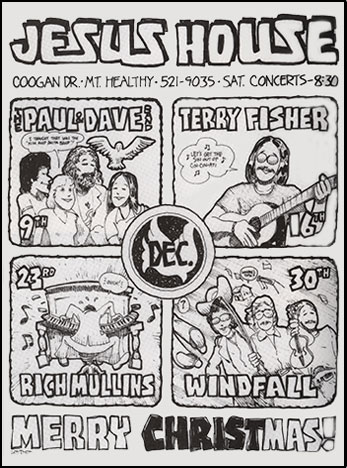
December 1976 Concert Poster
- Rich performs a Christmas concert at the Jesus House in Cincinnati, OH.
Fall 1976-Winter 1977
- Rich performed his song "Seminary Girl" for the second time.
1976-1977
- Richard forms The Rich Mullins Band which goes on to perform at various locations including the University of Cincinnati. The band included : Rich Mullins on lead vocal, piano; Rick Nohle (UC student) on strings; Bruce Kircher on guitar; Jon Hagee on percussion, vocals; Mark Hard on bass and Dean Heitcamp on vocals.
Jon Hagee: "Some background. I grew up in the Cincinnati area, had met Rich a couple times before entering college at CBC, fall of 1976. I was a drummer, singer, songwriter, guitar player in various HS groups, church, etc. My freshman year we became friends, attended midnight 'Silver Dollar' movies downtown, I stayed some nights at Richard's apt on the Univ of Cincinnati campus, we started a rock band (CCM-style) with some CBC friends, some UC students. And then... we arranged to play a concert on the Cincinnati Bible College campus. That was a *cold* winter. I remember seeing my breath as we practiced upstairs in what we used to call the 'Coach House'."
John Hagee (drummer): "This would have been Rich Mullins first attempt at forming and playing in a band. The band was together for about a year and played at colleges around the area, University of Cincinnati, etc."
- Rich (possibly) travels to Ireland with a group of fellow CBC students. (At this time, this has not been confirmed).
Early/Mid 1970s
- Rich Mullins attempts to write his first song on the guitar which he described as "kind of a love song." The lyrics included the following lines "Mary you was a fine girl but we went too far out of town, so I shot you in the back of my car and I buried you so you couldn't be found. Mary you was a fine girl."
Richard: "Doctor King provoked me to take up guitar."
1977
- Songs written this year include "Bartimaeus," "Best Thing," "Blowing Smoke Rings," "Cast Your Bread," "Goodbye Texas Creek," "Honest Reason Why," "Can't Go To Sleep," "Old Glory," "Salvation Shoes," "Lord's Prayer," "Water Into Wine," "Weird Connection," and "Where Else Can I Go?."
.
- Richard writes "Ben Shaw" about an ancestor.
Richard: "This is a song about an ancestor of mine. See, my great aunt was real crazy, and they finally had to have her taken care of in an institution. She just kept getting worse and worse.. kept trying to shoot the mailman and trying to steal from him. She had all the inheritance of the family because my great-grandfather, who was her brother, was an alcoholic and they decided that they’d better not give the money to him because he didn't know how to handle anything. So, she got all the stuff. When she had to be put away, we got all the stuff and my dad got all the guns of Ben Shaw.. who was one of the original settlers in Randolph County which is where I'm from. Did you ever hear of Jim Jones? He's from Randolph County, too. I just thought I'd tell you that. But, this is about a good guy. It's a song about wishin’ we could go back to a simpler time…"
January 1977
- Rich Mullins takes friend Jon Hagee to see the film Brother Sun, Sister Moon.
Jon Hagee: "When I was a freshman, you had to sign out to someplace to leave the dorm for a night. Rich signed me out, and we went to a midnight silver dollar movie downtown and watched a movie called Brother Sun, Sister Moon. If you've never seen it, I think that may have been the start of his interest in St Francis. Oh, and it was extremely cold! Anyway, we spent the night at an apartment up on Clifton, bordering the UC campus a shotgun house, maybe three or four rooms. At the time I thought it was his, but later someone said it was probably some friends who were out of town. It was almost empty, I slept on a couch, and Rich's room had a mattress on the floor, a guitar & a book, that was about all."
January 19, 1977
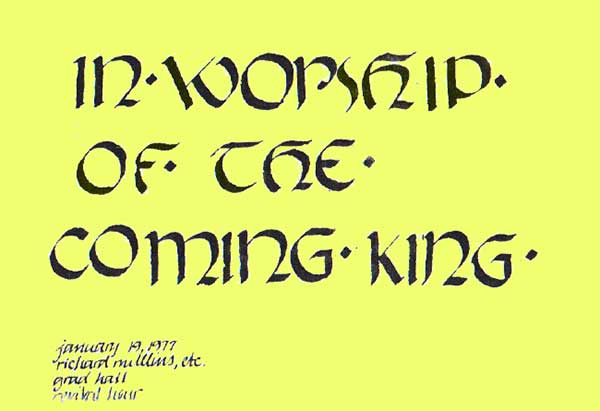
Concert Program
- The Rich Mullins band performs in Cincinnati, OH. at Cincinnati Bible College campus Alumni Hall. The concert was titled In Worship of the Coming King. The band included Rich Mullins - lead vocal, piano, synthesizer/organ, recorders, guitar, songwriter, Bruce Kircher on guitar, Mark Hard on bass, Dean Heitcamp, vocals, Jon Hagee on drums, percussion, vocals, Rick Nohle strings, songwriter (student at the University of Cincinnati). Pamela Richards designed and wrote out the program for this concert. The concert was opened by the band, then Rich did a few songs, then the band came back. Then after the formal concert ended, Rich did several more songs
Set List: Set In Motion/O Come All Ye Faithful/Ordination/Recorder Interlude (RM first recorder performance)/Pictures for a Friend in Summer/Tom Foolery & Isiah 40/All Around Me/Winter Hymn/Narnia, King Arthur, Washington & Jesus/Heaven In His Eyes/Wipe Away Every Tear From Their Eyes (by band member Rick Nohle)/Come Lord/O Come All Ye Faithful (reprise)
- Rich also performs a few songs by himself, after the concert - "Back To The Bible", "Lake Between The Hills", "K.J. Raffe", and others.
February 1977
- Rich Mullins, starting his second semester in 1977, begins to room with friend Mike Schultz.
Early 1977
- While working at Erlanger United Methodist Church in Erlanger, KY, Richard would perform the occasional concert at the church. The following set list is from one such concert performed sometime in 1977.
Set List: And the Lord/Bartimaeus/Homeward Ways/Happy Day Express Medley/Psalm Suite/Lord Jesus I Love Thee/It Must Not Be The Wind/Profit/Dr. Sting/Harlan County Waltz/My Heart Stopped Beating/Here In America/Devil's Back/Piano Signature/Heaven In His Eyes/There's A Land
- One performance at Erlanger was carried on a local radio station.
Set List: Psalm Suite/Hick Song Medley (aka "Happy Day Express Medley")/Devil's Back/All Around Me/Here In America/(talk - being the church)/Winter Hymn/talk - a person my age/Rolling Stone-Jesus
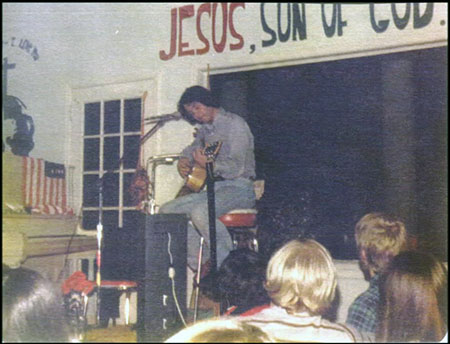
Rich during an early performance at the Jesus House
April 2, 1977
- Rich Mullins performs at the Jesus House.
April 1977
- Rich Mullins took his Erlanger youth group to Red Bird Mission, Bell County, Beverly, Kentucky to aid in flood relief efforts.
Summer 1977
- Rich Mullins writes "Come on and Come Alive."
Beth Snell Lutz: "I spent the summer of 1977 traveling with a CBS choir called Come Alive. Richard was working as Youth Minister at Erlanger Methodist Church and often took his kids to Christian music/events he could find in the area. Though our concerts were nothing like music at their favorite music gathering, the Ichthus Festival, he went out of his way to bring them all to hear us if we were in the area. We began most evenings with a sort of theme song called, appropriately, 'Come Alive.' Richard thoroughly and vocally disliked this song, and when the kids got sick of his tirades and told him to write his own... he did."
Mid/Late 1970s
- While Rich dated several girls at this time in his life, he had a long term "on-again, off-again" relationship with one girl in particular (name withheld for her privacy), to whom he was also engaged at two different times. Rich wrote "Doubly Good to You" for their wedding, but the engagement was later called off by his fiancée in the early 1980s.
Rich: "When I wrote 'Doubly Good to You,' we were getting married, and I had written that for our wedding. A friend of mine said, 'Boy, that is a really cruel song.' And I said, 'Well, why?' and she said, 'Because you are inferring that if God doesn't give you a love that is centered around someone that is true that he hasn't been doubly good to you.' I'm like, 'Well, exactly.' But God doesn't have to be singly good to anybody. We all have got it better than we deserve so we should be thankful for what we have."
Rich: "I just remember saying that I thought, 'Man, I'm going to write something really schmaltzy. This is going to be the Helen Steiner Rice of Christian music. And I'm just gonna write the schmaltziest drippiest song that I can possibly come up with. And that was 'Doubly Good to You.' And it didn't turn out as schmaltzy as I thought it was going to at the beginning. But the funny thing is everybody always reacts... I remember playing it for Brown Bannister just cause we were sharing songs one afternoon that we thought no one would ever cut. And I said, 'Man, this is a song that no one will ever do.' And I played 'Doubly Good to You' and he cried."
August 1977
- Rich and several friends, including Beth Snell and Kathy Sprinkle, move into the home of Mike & Darla Ash. Rich actually slept in a closet. There really wasn't enough room for eight people and the conditions were not the best. For this reason, the house is affectionately referred to as "the Ash-hole."
There were no co-ed residences approved by CBC. All the freshmen men were required to live in the dorm for one full school year. which Rich did. Women were not permitted to live off campus while attending, unless they were married or lived with their parents. When CBC female students went visiting a man at an off-campus apartment where he resided, a married (CBC) couple was supposed to be present to supervise. The Ash House bent this rule by allowing women to reside in a home owned by a CBC couple, Darla and Michael Ash. The Ash House was situated in a working lower-class neighborhood in an area called Price Hill.
Kathy Sprinkle: "Mike and Darla Ash had bought this 'hellhole' of a house over on Purcell Ave. and he’s like 'Sprinkle, Sprinkle we gotta go there, come on we're gonna go there now,' so we sign out and this awful, old, two family dilapidated house and he’s like 'Mike and Darla are going to like start a community here, you're gonna do that and we need to move in here and I'm like 'You’re nuts, you're nuts, right?' So we stay there the night, awful, horrible, drafty place, go back and talk to Elizabeth and she's like 'I'm in. We're going to do this.' Eight people, eight cats, a couple of dogs... Their name was Mike and Darla Ash so we called it 'the Ash Hole.' Rich never did have a bed there. He had a closet he slept in and as (Cathy) Snyder always said 'A sleeping bag that smelled like a giant armpit.'" (Source: A Ragamuffin's Legacy documentary 2014)
Beth Snell Lutz: "In the Fall of 1977, a bunch of us moved from college to 'the Ash Hole.' When we started Zion we all lived together at a house in Kentucky. We then moved the girls into what became the Beech House and was Zion's main base. and the guys lived in apartments nearby. It was a big house at the dead end of Beech in Price Hill. It was the community house for Zion where we practiced, housed youth groups and housed all us females in Zion from about 1978-83. Everyone stayed off and on at the Beech House, including youth groups, CBS runaways and hitchhikers Richard picked up."
- Songs performed in these years include "23rd Psalm" (aka "Always Here With Me")
"Borrowed Time,"
"For the Beauty,"
"My Heart Stopped Beating,"
"Stolen Kisses," and
"Where Else Can I Go."
August 19-21, 1977
- Rich Mullins discovers the hammered dulcimer while in college while visiting the Roscoe Village Dulcimer Festival in Coshocton, Ohio.
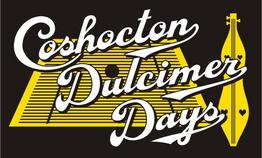
Rich: "The first time I heard it in fact - when I went to college I had decided to be at peace at myself ever in my life... I was going to have to learn to appreciate my own heritage and my Dad is a total hillbilly. I mean, he was born in Appalachia, Virginia. So I thought Ok, as part of my education, I started listening to Appalachian music. Got familiar with lap dulcimers - the kind that you strum. This friend of mine called me up and said 'Hey they're having a dulcimer festival.' Which I thought was going to be really boring because they're just a three or four stringed little instrument. And I've heard a lot of people play them very badly. But, nevertheless, we were going to canoe to it. So I thought that would be a lot of fun. So, we canoed into Coshocton, Ohio we canoed down the Walhonding - down the Mohican. Got to Coshocton, Ohio right about sunset. It was like being on the set of the Daniel Boone TV series or something. You know, Coshocton is this old restored town, and we come up in this canoe with my lap dulcimer floating in the middle of the canoe and I heard this incredible music. And I was going 'Man, what are they playing?' So, we got out and ran up the bank. And went over to the middle of the festival and there was about six hammer dulcimers in a circle. And they were all playing simultaneously. It was like being in the middle of a music box. I started saving my money right then. And never did get enough. In fact, I finally did have enough to buy one and my car broke down and had to spend the money on that. But, I was in East Tennessee at the time. I was doing a interim ministry in East Tennessee and the people from the church that I was interiming - they bought me one. Wasn't that nice? So it pays to have your car broke down." (Source: WLAC Brian Mason Interview 1988)
August 29, 1977
- Rich Mullins and his friend Rich Griffith attend a Yes concert at the Riverfront Coliseum in Cincinnati, OH.
Rich Griffith: "Rich and I went. To date it was the best concert I’ve ever attended. Rich was mesmerized. I was mesmerized. Afterward he shared his insight into the musicianship of the music." (Source: Rich Griffith)
November 6, 1977
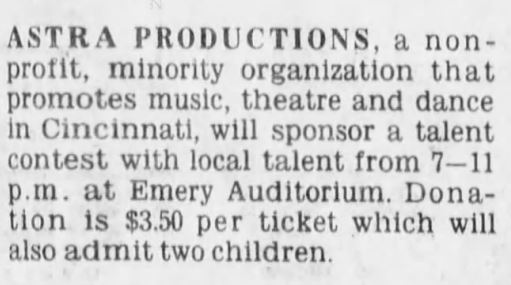
- A group from the "Ash Hole," including Richard, Dave Marsh, Beth Lutz, Cathy Snyder and others, enters a "Cincinnati Talent Competition," sponsored by a minority organization that promotes music, theatre and dance in Cincinnati.
Beth Snell Lutz: "The Fall of 1977 found a number of our ragtag bunch moving from CBS into our first experience at community living in the home of an adventurous married couple in Price Hill with the last name “Ash”. As most of us were sarcastic teenage college kids, their name soon lent itself to the nickname, 'The Ash Hole' ...though I'm sure no name would've been safe from us. Shortly, the house greeted Richard's piano, guitar and lap dulcimer as well as late night harmonies, laughter, passionate debate, not a little argument, friends, youth group sleepovers, cat poop and utter chaos. A close high school friend of Richard's, David Marsh of the awesome voice, came for an extended visit. Cathy Snyder (Weber).. of the equally awesome voice.. lived with us at the time.. hence came a happy problem.. there was no stopping the music. We'd soon worked up a number of songs.. because we couldn't help it. And then there came a lap dulcimer. As it was an Appalachian instrument, Richard loved it and immediately began writing for it. Richard had been depressed and basking in CSNY.... As only Richard could get away with saying, 'I hope it isn't offensive to you.. but, see, I like it and I've gotta play it because it's killing me!'
News of a 'Cincinnati Talent Competition' came to us and someone decided we needed to enter?? Richard had recently begun working as the youth minister/choir director at the Erlanger United Methodist Church. As his kids there had renamed him 'Chard,' it was decided that would be the name of our little band and it was done. When we arrived at the Emery Auditorium downtown in Cincinnati, we were the overwhelming minority. After a 20 minute raucous rendition of the song 'Brick House' was loudly enjoyed by all, we went onstage and underwhelmed with our little 4 part harmony acoustic lap dulcimer/guitar song, 'Honest Reason Why' (lovingly renamed 'On the Streets and Why'). I tried my limited hand at a song with Richard, and then Snyder, with Richard on piano, brought down the house. I'm not sure the response rivaled that of 'Brick House,' but when Cathy began 'Hi Di Ho,' the crowd immediately and very vocally got on board. I'm fairly sure it was the largest audience for any of us at that point in our teenage lives, but what began as a daunting prospect changed the moment Cathy began to sing. She redeemed our little band's performance that night while creating a cherished memory. Her voice has always been a favorite and harmonizing with her one of the most beloved musical experiences in my life. Needless to say, we didn't win the competition."
- During the competition, a singer by the name of Myrtle Bailey walked out on stage and said she was there to "sing for Jesus." After the competition was over, Richard and the "Ashe Hole" gang find her in the crowd and Richard beggs her to join them for a few songs a few weeks later at CBC.
Late 1977
- One of the Ehrlanger United Methodist Church families asks Richard to perform at an event for the employees of a business owned by the family. Richard, along with Cathy Snyder and Beth Snell, performed for about an hour at the event. The performance for the Long Brothers event of entirely secular music included "God Bless the Child", "I'm Listening", "Finger Poppin' Good" and the medley from the play "Oliver.
November-December 1977
- Myrtle Bailey, the woman from the Cincinnati Talent Show joins Richard and others for a show at CBC Revival Hour. Songs performed include the written originals "Aint No Books Sold," and "Water Into Wine," as well as a cover of Andrae Crouch's "Tell Them" and "I Have Decided."
1977-1978
- Richard's high school Friend David Marsh begins working with the Dayton, OH band Tailwind. The progressive rock quartet consisted of Drummer Tim Shoemaker, Bassist Carl Couch, Guitarist Eric Loy and Dave on vocals. The band released two 7" singles, Shake in the Wind in 1977 and Still Air/Pristined in 1978 before breaking up.
1978
- Rich meets David Strasser (who became known to Rich's fans as Beaker) around this time. Rich was friends with Beaker's Youth Leader. Beaker was in the 7th grade at the time. The two would go on to be great friends, roommates and songwriting partners. While Beaker is probably best known for penning the song "Step By Step," the first song the two would write together would be "Boy Like Me, Man Like You."
Beaker: "When I was 13 or 14, Rich was in a group called Zion and... It was a church that my parents belonged to but I hated going to church. Somebody had roped me into going to this weekend thing where Zion, who did weekend retreats and concerts and stuff... he (Rich) was there with that group. That was the first time that we ran into each other. I remember him specifically because we had this - it was like an all-nighter thing and at 14 years old I ate a lot of sugar I think. And though I had a small body, I had strong lungs. We were staying all night at this place ... these people's house and me and two other friends were being up and rowdy kind of all night and I remember very specifically in the darkness this figure standing straight up - sleeping back up to his (chest) yelling for the three idiots to please shut up so he could get some sleep. That was our first meeting." (Source: Family Broadcasting Corporation Seminar 1994)
Rich: "We first met when he was about fourteen and I was in a college retreat ministry. We were doing a weekend at his church, and he was the most obnoxious kid in the youth group! I just knew that Beaker's life was not going to be an ordinary one. He was either going to be extraordinarily bad or extraordinarily good. I think the thing I love about Beaker is that he is one of the most brutally honest people I have ever known. He's really hard on himself. He is also super idealistic and that idealism can sometimes bite you and turn into cynicism. It can kinda flip-flop between being really cynical and really idealistic in a matter of seconds. But he's just a good person. I'm not sure how to describe it - there's just a goodness about him. He is definitely one of my most valued friends. "
Beaker: "I was a weenie then."
- Reed Arvin graduates from North Texas State University. After a difficult start, Arvin worked his way up to pianist with the number one band and was also ranked first in the school among combo pianists.
Reed: "When I went there, I was doing a lot of very involved electronic music. But I concluded that I wasn't really prepared to handle all those possibilities. I went back to learning my basic instrument - acoustic piano - and I find I have much more of an emotional involvement with it now."
Reed: "I was working two jobs plus studying classical and jazz piano. I had no time of my own. I'd work the big band at Six Flags in Fort Worth, get off at 6:30, jump in the car and actually change clothes while driving on the Dallas-Fort-Worth turnpike. Then I'd get to the Dallas job at 8, and play the rest of the night. I was so busy I had no chance to practice or grow. I could see myself doing that forever."
- After Graduating from TSU, Reed Arvin takes a job as "Jazz Artist-in-Residence at Bethel College in Kansas. Arvin worked 30 hours a week as a performer and counselor to young musicians at Bethel College and High Schools in Hesston, Peabody, Halstead, Newton and Mound Ridge.
Reed: "One day I just happened to see a notice on the bulletin board for jazz artist-in-residence at Bethel College. Well, that sounded pretty good for a 22-year old. And I'd also set a goal. It's a thing to do. I can't explain it very well, but it works. I set a goal for myself, and then I think about it a bit, pray about it.. and pretty soon, it just happens. Back when I was at Baylor, I really liked being in a Christian atmosphere, and I decided that someday I'd love to teach in a school with that kind of atmosphere. So I stood at that bulletin board, reading the notice and saying to myself, 'I don't know how I'd ever have a chance at it, but I'll try.' I sent my tapes up to Don Kehrberg (Bethel's Instrumental Music Director) and that Spring, when I appeared at the Jazz Festival, we talked and I got the job."
Reed: "Working with those kids is gonna do me a lot of good. I'm learning a lot about communication. For instance, at Bethel, I've blown some people away with my ideas. And those guys can take it. But at the high schools, when I play records of work I did in Texas, the kids either don't understand it or they get depressed. So I'm not playing much in the high schools, just working with them where they are in their own development. You know, we tend to forget that jazz playing is standing up in front of people and saying, 'Here it is, folks.' And when you're a kid, it's tough enough just to get out the horn and play. They don't need me coming in and cooking out their brains. There are some people in the high schools who are right there and they'll become serious jazz players. That's great. But, besides that, by the end of the year I think the vast majority of kids will develop a real appreciation and critical faculty in jazz. They'll become a whole new generation of jazz fans."
- Songs written this year include "Changes" (with Tom Weimer).
Early 1978
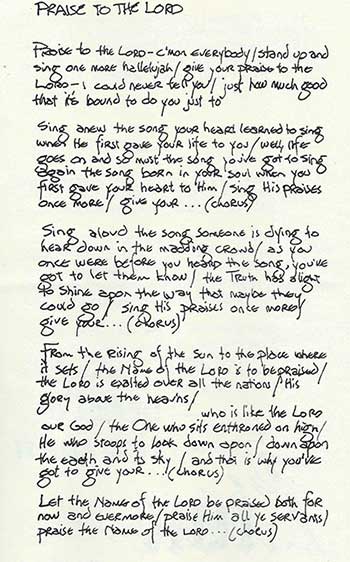
- Rich Mullins writes "Praise to the Lord" around this time. Alternate titles for the song listed in Meadowgreen's files are "Praise To The Lord," "Sing" and "Sing Your Praise." It is believed that the first performance of the song took place at Erlanger.
Rich: "I wrote it ("Praise to the Lord") because I was practicing Bach's C Minor Fugue, and when I got to where I could play it decently, I just didn't want to quit, so I wrote the introduction, which led to the song. I hope Bach would like it. His music is way more important that the Christian music you hear now. I'm not saying today's Christian music has no value, I'm just afraid that we miss the real value of it, and use it for something it's no good at. It's value lies in its ability to point beyond itself to Christ."
Beth Snell: "It was 1978 and he was taking a music theory class at CBS and they had him learning about 'the masters.' They began putting him through his paces to play their works, he realized how hard it was to play with such precision and he kinda fell in love with the music and how much it stretched and pushed him. He got stuck working the Bach Fugue over and over and over until his fingers would trail off and do other things than was written on the page. Needless to say, he took liberties. One day he asked me to come over as he'd written something he wanted harmonies on. He was so proud of it, and there was a lot of 'Do you like it?' in the air. I wasn't sure I cared much for it until I heard the bridge. Then I was all in."
March 1978
- Rich Mullins performs for a Chapel Service at CBC.
April 28-29, 1978
- Rich takes his youth group kids to the ICTHUS Music festival in Wilmore, Kentucky. Headliners at the 1978 Ichthus festival included Larry Norman, Daniel Amos, and Phil Keaggy. (Trivia: The 1978 Ichthus Festival has also became somewhat famous in the news for another attendee - future Vice President Mike Pence, who has stated that he became a Christian at the festival.)
Following the festival, Mullins began to realize the power of music in the lives of young people. Prior to this, music was something done on the side while he focused on wanting to be a Youth Minister.
Rich: "I was just watching the kids (at the Ichthus festival in Wilmore, KY) and how affected they were by the music. I really felt like I had some gifts
in music and at the time I just prayed 'Lord, I want to do this but I want to take the steps'. The next morning my neighbor was sick and didn't go to
work and I was just playing the piano when there was a knock at the door. He wanted to know if it was me who was playing the piano and I said yes. He
said, 'Well, I don't know what you do for a living but you should be in music'. So I though that was either a really weird coincidence or an answer
from God. Within a week I had several people calling me." (Source: Live Like You'll Die Tomorrow - Rich Mullins Speaks His Mind,
The Cross Examiner, Brian Smith, October 1, 1986)
April 30, 1978
- After attending the music festival....
Rich: "The next morning my neighbor was sick and didn't go to work and I was just playing the piano when there was a knock at the door. He wanted to know if it was me who was playing the piano and I said yes. He said, 'Well, I don't know what you do for a living but you should be in music'. So I though that was either a really weird coincidence or an answer from God. Within a week I had several people calling me." (Source: Live Like You'll Die Tomorrow - Rich Mullins Speaks His Mind, The Cross Examiner, Brian Smith, October 1, 1986)
Rich: "When I got home, I had two or three people in a couple of days call me out of the clear blue sky and say 'Rich, we'd really want to hear you do a concert. Would you consider coming to the Church and doing it?'. I just said, 'No, I'm a Youth Minister now and I only do music for my own pleasure.' Well about the same time, I began to think this is really strange that this started to happen right at this time when I was hit with this thought. So I began to pray and I called some friends in and we all began to pray about a direction and I felt that God was leading me into the music ministry. "
June 3, 1978
- Rich Mullins performs at the Jesus House in Cincinnati, OH.
June 10, 1978
- Rich Mullins and Beth Snell provide piano and vocals for a wedding at the Andover Church of Christ in Andover, OH. at 2:30p.m.
Late June 1978
- Rich left his job at United Methodist Church in Erlanger, KY. Rich, along with friends begins to make plans to start a music and teaching ministry, which would include a band called Zion. The first official line up of Zion was Richard, Pam Zea, Kathy Sprinkle, Beth Snell and Tammy Wells. Beth, who had a full time job at the time, had to miss many Zion performances at the time due to most gigs being scheduled on the weekends during a time that she was usually working.
September 2, 1978
- Rich Mullins performs at the Jesus House in Cincinnati, OH.
October 1978
- Zion grows to include Richard, Tammy Wells, Jenny Filson, and Joel Grubbs on Bass. Beth Snell continued to join the band as her schedule allowed.
October 22, 1978
- Reed Arvin performs at Bethel's Annual Thresher Jazz Concert at the Krehbiel Auditorium in Kansas.
November 18, 1978
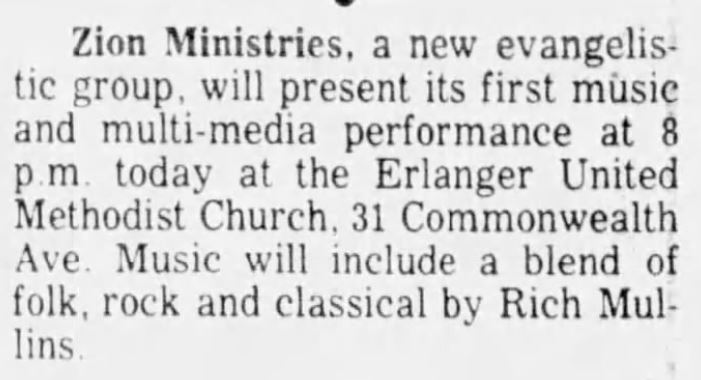
- Rich Mullins with Zion at Erlanger United Methodist Church in Erlanger, KY. at 8p.m. The event is billed as the "first performance" from Zion Ministries.
December 10, 1978
- Rich Mullins and Zion perform a concert at the United Campus Ministry at Miami University, Oxford, Ohio.
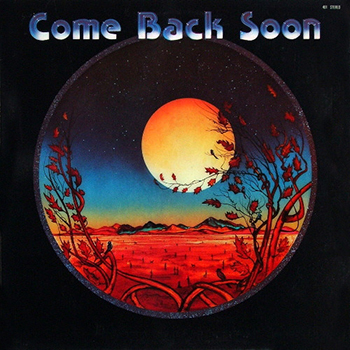
- A various Artists compilation entitled Come Back Soon is released on Sangre Records. The album features a song from Panacea, entitled "Mountain Climber." Panacea was Jimmy Abegg on vocals, banjo and guitar, Sharon McCall on background vocals, Michelle Zarge on background vocals, Tomm Goodluinas on violin and background vocals, Marty Dieckmeyer and Alex MacDougall, both of Daniel Amos, on bass and drums.
December 23, 1978
- Rich Mullins performs a Christmas Concert at the Jesus House. "You Gotta Get Up" (later recorded for the album A Liturgy, A Legacy & A Ragamuffin Band) was written and performed for this show.
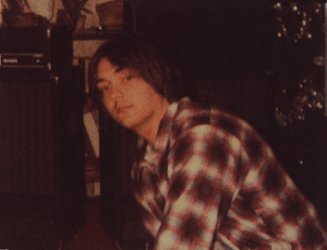
(Christmas 1978)
1979
- Stephen Sondheim's Soundtrack to Sweeney Todd, the Demon Barber of Fleet Street is released. This becomes one of Rich's favorite albums.
- Songs written this year include "Baptism,"
"But For Your Grace,"
"Crucifixion,"
"Darkness,"
"Dirt,"
"For Unto Us,"
"Grateful,"
"He's Comin' Back,"
"Lord Help Me Be,"
"Mary Picked the Roses,"
"Nearer To You Lord,"
"Never Heard the Music,"
"Overland,"
"Regions of Light,"
"Resist the Devil!,"
"Run Again,"
"She Who Is In Babylon,"
"Sing Unto The Lord,"
"Thunder,"
"You Gotta Get Up" (later recorded for the album A Liturgy, A Legacy & A Ragamuffin Band), and "You Standin' There."
January 15, 1979
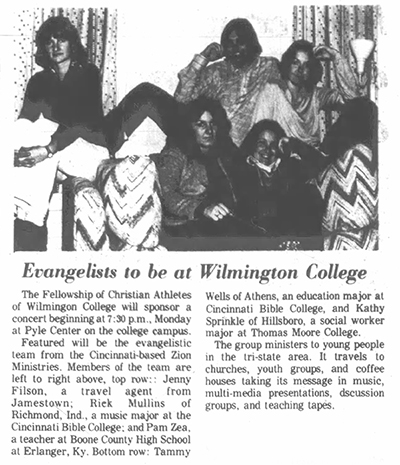
- Rich Mullins and Zion perform at the Pyle Center of Wilmington College in Wilmington, OH. at 7:30p.m.
January 30, 1979
- Reed Arvin and his band The Dallas Jazz Quartet performs at the Marple Theater in Wichita, KS. The group also conducts a series of workshops and clinics in local high schools.
January 31, 1979
- Reed Arvin and his band The Dallas Jazz Quartet performs at the Marple Theater in Wichita, KS.
February 2, 1979
- Reed Arvin and his band The Dallas Jazz Quartet performs at the MKrehbiel Auditorium at Bethel College in Newton, KS.
Spring 1979
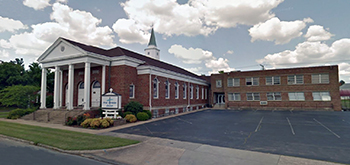
- Rich begins working in an interim position with the Youth Group at First Christian Church in Kingsport, TN. John Turner was the Youth Minister and Gary Richardson volunteered to help with the group.
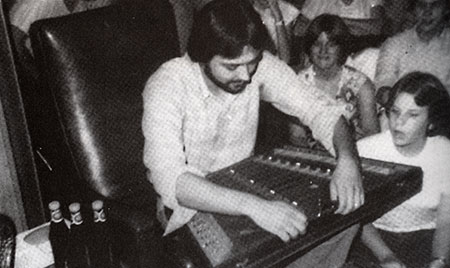
"Chard" receiving a special gift
- Members of the First Christian Church give Rich his first Hammered Dulcimer.
- One of the first songs Rich wrote on his new instrument is an instrumental piece entitled "H.D. Pinger," which would occasionally show up in concert for many years to come. The second song written on the Hammered Dulcimer was a song called "Noah."
Beth Snell Lutz: "I think the first song he wrote for this new toy was the much loved "H.D.Pinger." The second, not loved by any of us, was "Noah." It must have been good to be him when he could outvote us all with just one vote. Yep... I hate to tell you, but the boy could be belligerent and stubborn. Fortunately, he could also be thoughtful, charming and had a great laugh."
Unknown date 1979
- Rich Mullins performed a concert at the Hub in Cincinnati Ohio. Among the songs he sang were "Run Again."
April 22, 1979
- Reed Arvin performs at the Wichita Jazz Festival in the Century II Convention Center in Wichita, KS.
May 26, 1979
- Zion performs at the Jesus House in Cincinnati, OH.
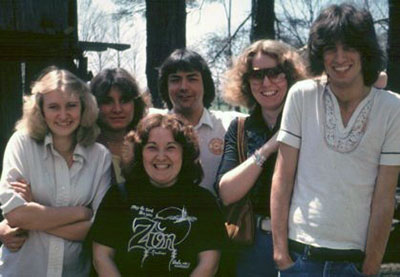
Zion (Spring of 79)
June 15-16, 1979
- Zion Performs at the Sonshine Festival at the Butler County Fairgrounds in Hamilton, OH. Other performers included The Imperials and others.
Late Spring 1979
- After the departure of Joel Grubbs and Tammy Wells, Zion becomes Richard, Pam Zea, Beth Snell, Kathy Sprinkle, and new guitarist Tom Weimer. Gary Rowe also begins working with Zion to plan retreats.
Mid 1979
- "Hope to Carry On" was written around this time and would later be recorded for Zion's independent album Behold the Man. Early or alternate titles for the song that exist in the publisher's records include "Love Has Come" and "Love To Carry On."
August 1, 1979
- Zion Ministries was officially incorporated as a domestic non-profit organization in Kentucky for the expressed purpose of operating "as a singing, teaching, writing outreach of the Gospel of Jesus Christ (included sale of albums, tapes, t shirts, etc.)." The organization will produce religious publications and produces retreats.
August 4, 1979
- Zion performs at the Jesus House in Cincinnati, OH.
August 6, 1979
- Zion performs at the Mustard Seed Christian Center in Sydney, OH.
August 11, 1979
- Zion performs at the Lone Oak Christian Church at Seeger Memorial Chapel in Milligan College, TN. at 8p.m. This was part of a youth rally sponsored by the Lone Oak Christian Church. No admission was charged.
Fall 1979
- Zion performs a concert at Americana Amusement Park in Monroe, Ohio.
September 3, 1979
- The Rick Elias Band performs at Madame Wong's in Los Angeles, CA.
September 4, 1979
- The Rick Elias Band performs at Madame Wong's in Los Angeles, CA.
October 6, 1979
- Zion performs at the Mustard Seed Christian Center in Sidney, OH at 8:30p.m.
October 10, 1979
- The Rick Elias Band performs at Madame Wong's in Los Angeles, CA.
October 14, 1979
- The Rick Elias Band performs at Club 88 in West Los Angeles, CA.
October 27, 1979
- Zion performs at the Jesus House in Cincinnati, OH.
November 21, 1979
- The Rick Elias Band performs at Madame Wong's in Los Angeles, CA.
December 7, 1979
- The Rick Elias Band performs at the Skeleton Club in San Diego, CA. The performance was part of a benefit show to help the club and attended by more than 300 people. According to the club owner, around 600 people showed up but many had to be turned away.
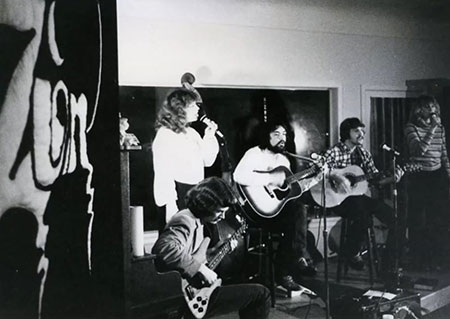
Zion in concert
December 22, 1979
- Zion performs a Christmas concert at the Jesus House. Songs included: "Happy Christmas (War Is Over)" (by John Lennon), "Away In A Manger," "You Gotta Get Up" (later recorded for the album A Liturgy, A Legacy & A Ragamuffin Band)
Set List: For Unto Us/Praise to the Lord/Overland/Worries of the World/Never Heard the Music/Bartamaeus/Darkness w/Psalm 42/Happy Christmas (War Is Over)/The Song was Broken/Grateful/Maggie's Song/Starry Night/Butterfly/But for Your Grace/You Gotta Get Up/Away in a Manger/Hallelujah / For Unto Us
December 31, 1979
- The Rick Elias Band performs at the Roxy Theater in Pacific Beach, CA for New Years Eve.
All pages = © 1996- Eric Townsend All Rights Reserved. Do not reproduce or publish without permission.



|





